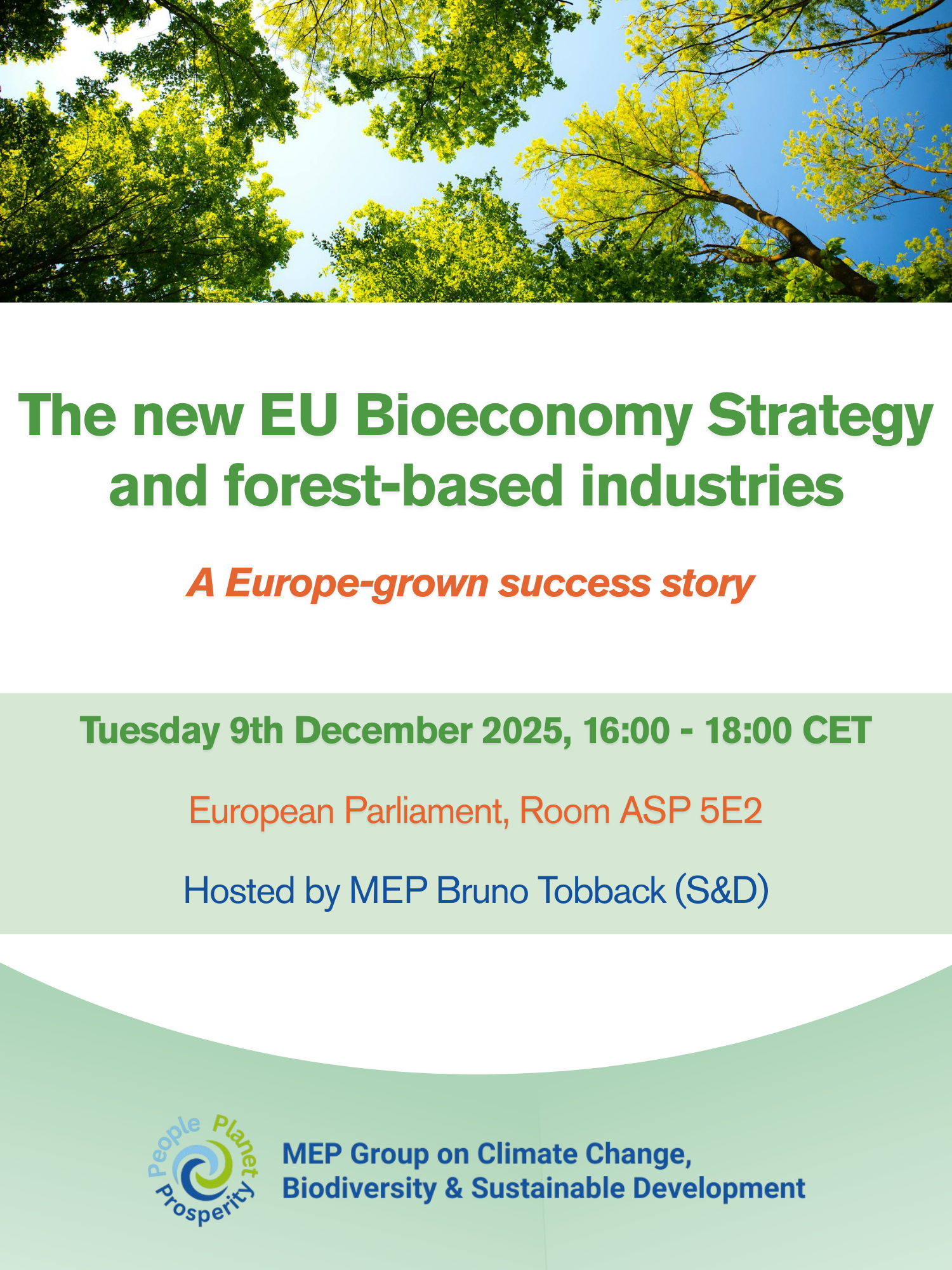
The new EU Bioeconomy Strategy and forest-based industries – A Europe-grown success story
Tuesday 9th December 2025 at 16:00 – 18:00 CET
Organised at the European Parliament, Brussels (Room ASP 5E2)
The upcoming EU Bioeconomy Strategy aims to boost innovation and support European companies in making a success of the green transition. While circular and sustainable production, and consumption of biological resources for materials and services, can increase efficiency and reduce pressure on resources, this strategy is expected to put forward actions to unlock the potential of bioeconomy, generating green jobs and growth. At the same time, it is expected to focus on reinforcing circularity and sustainability, as well as contributing to the decarbonisation of the EU economy. Moreover, it will set the framework conditions to enable bioeconomy startups, entrepreneurs and new business models to thrive, without damaging nature. While the global bioeconomy is on track to hit €7 trillion by 2030, the latest figures show that the biomass-producing and converting sectors of the EU bioeconomy generated €812 billion in value added in 2022. That’s around 5% of the EU’s GDP, and it grew by 12% in just one year. Europe therefore has the potential and should be aiming for a stronger share of a rapidly developing sector of the green economy of the future.
The forest-based bioeconomy stands as one of Europe’s strongest industrial ecosystems, representing one in five manufacturing facilities and supporting over 180,000 direct jobs across rural and regional areas. As a sector sourcing 85% of its raw materials from within the EU, it offers renewable and circular solutions for packaging, hygiene, construction, energy, and more—driving strategic autonomy and substituting fossil-based, imported materials. Our industry is already delivering: pulp and paper biorefineries have doubled their turnover to €6 billion and cut over 3 mega-tonnes of CO₂ in just three years. With demonstrated leadership in innovation, decarbonisation, and material circularity, the sector’s contribution to the green transition is both proven and scalable. From biochemicals and textiles to bioenergy and advanced paper solutions, the forest-based bioeconomy plays a critical role in delivering an industrial model that meets the EU’s climate and competitiveness’ objectives.
This event of the MEP Group on ‘Climate Change, Biodiversity and Sustainable Development’, taking place around the release of the EU Bioeconomy Strategy under the Clean Industrial Deal, comes at a pivotal moment when the bioeconomy can play a key role via becoming a cornerstone of the EU’s green growth strategy. Therefore, this event aims to inform policy discussions taking place within several key Committees of the European Parliament, and underline the multiple benefits of bioeconomy for sustainability.
Final agenda
Event moderated by Ilias Grampas, Deputy Director, EBCD, Secretariat of the MEP Group on ‘Climate Change, Biodiversity and Sustainable Development’
16:00 – 16:15: Welcome participants
16:15 – 16:25: Opening remarks by MEP Bruno Tobback
16:25 – 16:35: Intervention by Agata Kotkowska, Deputy Head of Unit (B1) on ‘Circular Economy, Sustainable Production and Consumption’, DG ENV, European Commission
16:35 – 17:05: Reactions by:
• Mathias Kirkegaard, Environment Attaché, Permanent Representation of Denmark to the EU
• Marco Rupp, Deputy Executive Director, Bio-based Industries Consortium (BIC), on behalf of the European Bioeconomy Alliance (EUBA)
• Krista Kimmo, EU Affairs Manager, Metsä Group
• Inge Arents, Managing Director, Flanders’ Food, on behalf of the European Bioeconomy Cluster Alliance (EBCA)
17:05 – 17:10: Reaction from MEP Elsi Katainen (video-message intervention)
17:10 – 17:50: Q&A session with the audience
17:50 – 18:00: Closing remarks by MEP Bruno Tobback
For the full concept note, click here